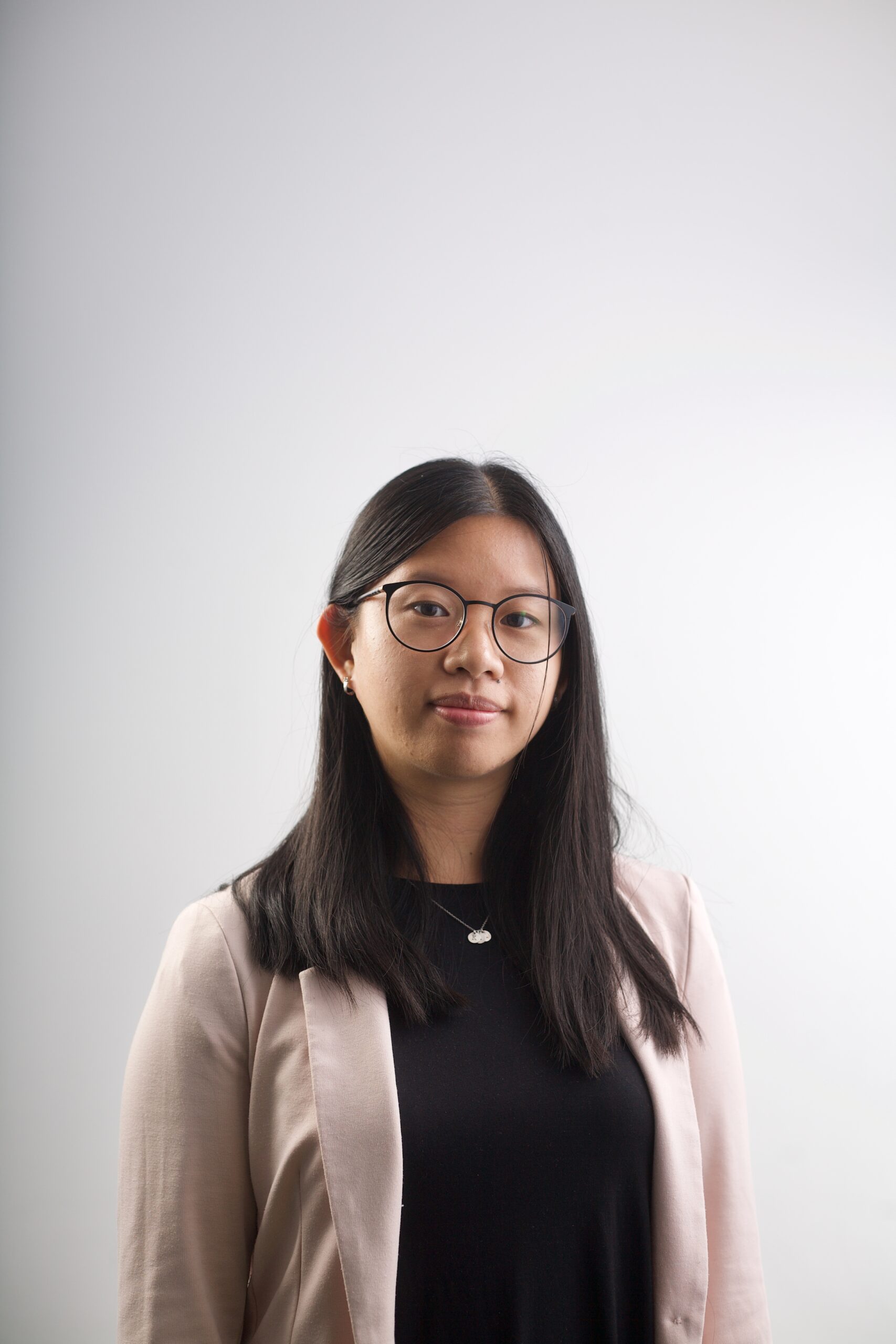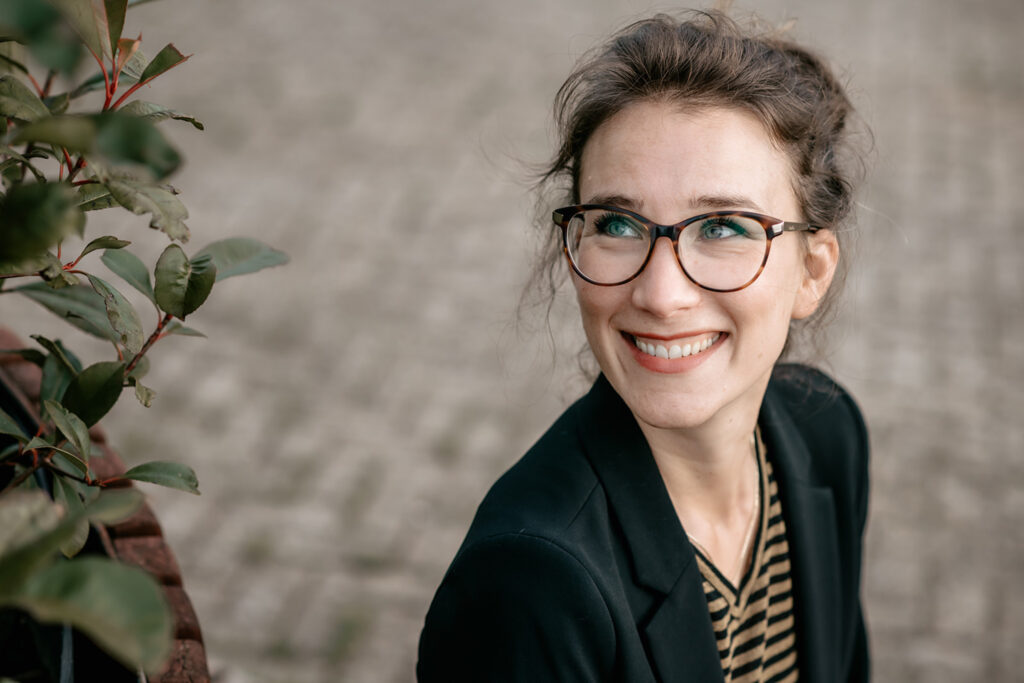Dr. Carolin Ossenkop (private)
As the idea of graduating comes closer to mind, the question of facing the uncertain next steps arises in one’s head as well – how do we face such a season?
I asked Dr. Carolin Ossenkop about it, whom I have worked with during my secondment with PORTIA. I knew that she had gone through exactly the same experience before and had navigated it really well. This is evident by her current position at Radbound University as interim program director for diversity, equity, and inclusion (while also teaching and coordinating courses there) and that she also runs Connectify, her own coaching and consulting company – which is one of PORTIA’s partners, through which we got to work together.
When I asked whether she knew what path she wanted to take after her PhD, I was taken by surprise as she quickly told me: “I never had a plan.”
But then how did she get to where she is now? And what was that process like, facing the uncertainty of graduating without necessarily having a particular plan? Let me re-tell parts of her story and what I appreciated a lot from what she had shared.
Parts of the journey will be difficult.
“It’s not that I didn’t want to have a plan – it just never came up… and it was difficult.”
As I invited Carolin to share her academic journey with me, I could see how the theme of uncertainty has always been present throughout the process, and it was, indeed, difficult.
After graduating from her master’s degree, Carolin was working in a consulting firm, yet the financial crisis one year later led the company to shut down their business, forcing her out of work. She tried different other positions, and none of them really worked out. After being encouraged by different people, she applied for a PhD position in Business Administration and Social Sciences and got accepted into Vrije Universiteit Amsterdam. Yet in the middle of her PhD, she experienced burnout as she was trying to carry out her way to graduation. Carolin pointed out, “I think this is important to mention… because there are so many people struggling with that.”
I am grateful that Carolin was not shying away from sharing how intense and difficult the process of finishing a PhD is, alongside figuring out what your next steps may be. I believe she wanted to encourage others who are facing such difficulties, including navigating burnout, when she told me why she had shared this part of her story: “it is important to share this part of the story to show that there are ways to work with it, live with it, and find your own way to finish (your PhD) or to do what you want to do, even when you have to take these (difficult times) into consideration.”
And she did indeed find a way to finish her PhD and fight through the difficult time, as she told me in the next parts of her story.
Making choices that are “good enough”.
In the middle of her burnout, she found out about the possibility of working with horses, which became a turning point for her.
Not only did she find personal enjoyment in equine-assisted interventions, but she also figured out that working with humans and horses could be her own way to educate organizations on subjects related to diversity and inclusion – the interest that was close to her heart.
As Carolin finished her PhD, she decided to take a postdoc position at her university with focus on diversity work, although it was not necessarily in a topic that she fully identified herself with.
In that process, although having any clear or explicit plan, she was convinced that further research on equine-assisted interventions as an alternative to a more common and traditional diversity and inclusion intervention was important to her. She decided to take seven months of unpaid leave so she could write a funding proposal for studying this subject.
“What I realize now… is that I really understood that I can only function or do my work if I can do it in a way that fits with me and how I am. And that can be very different from… ‘ideal images’.”
I really thought that this example was courageous and unique. It is not the usual “plan something clearly in advance and stick to the plan” narrative, but Carolin just found something she believed in and tried different ways to go closer towards it – even when the topic was clearly not “traditional”, especially in the context of diversity training.
When I asked her what gave her the confidence to make such unconventional decisions, she told me that over the years she has learned how to prioritize choices that were true to what she had believed in and understood.
She emphasized that it is important to focus on what options have been backed up by evidence and research, but also, “the decisions I had made in the past give me the confidence to do the things that I do.… This is something that I never dared to do… when I was younger, but now I think… If I’m doing things that I don’t believe in… then I’m also not good at it.”
I loved her reflections on what it means to face uncertainty by choosing to do work that is “good enough”: work that is true to oneself, that values one’s knowledge and experience, and that is personally meaningful and significant, even when the work (and the process to get there) is not traditionally labeled as an “ideal plan”.
In the end, even though the proposal she wrote did not get funded, as I re-tell in the next part, she managed to identify many other opportunities thanks to her decision to stay open with curiosity. As she embraced the process of finding ways to work on things she believes in, she said, “things just happened”.
Planned Happenstance?..
One time when she was teaching at the university, during coffee break, she had a conversation with a colleague and figured out she could join his course on turning your research into a business. Out of curiosity, she joined the course. As if on cue, not long after, some people approached her to ask whether she could do some training with the horses. To take on that job, she would have had to be enlisted as either part of an organization or a business – neither of which was true for her. Seeing the opportunity, this moment became the beginning of how she established her own consultancy and training company.
She reflected on how these sets of decisions not only allowed her to gain even more skills and opportunities in the exact field that she was passionate about, but also improved her teaching because of the experience she gained from working with clients on diversity in organizations. She also obtained ever-growing new empirical knowledge about diversity because she is doing research and teaching at the university and somehow, in the end, landed into the current position she has right now as a program director, alongside all the other activities.
This reminded me of the article I had to read for one of my courses on career development, on “planned happenstance” – it’s an intentional oxymoron in describing the open-minded state of persistently exploring our interests ”just because” and finding out down the line that “things happen” as a result. I read it in an article for career counselors as an approach to try. They suggested that instead of prescribing a solution (e.g., what career titles or positions might be good), counselors can invite their clients to acknowledge the anxiety of planning the future and the unpredictability of the process, then inviting them to reframe goals, focus on staying excited about being curious, learn to take advantage of unplanned events, and think about specific set of actions that can increase the likelihood of desirable outcomes. I love that these are the same themes that I am seeing from what Carolin shared.
“Don’t stress about it.”
“I really always felt very bad about it when I was studying and during the PhD… that I don’t have a plan because there were so many people around me who had a plan… For a very, very long time I was so stressed out about this. But then again, it is fine… If you have a plan, that’s great… If you don’t have a plan, don’t stress about it! Because that can also turn out in a new way that was probably unplanned but that’s okay.”
As Carolin stated, in the end, facing uncertainty is never easy. But it doesn’t mean that life is lacking meaning and/or the difficulties cannot be overcome. As she believes, we can and will learn so much from it if we decide to be open and hopeful. We can go through each uncertainty with confidence that somewhere down the line we know ourselves even better and “things happen” as long as we stay open to them and seize them.
I hope this encourages you as much as it has encouraged me!
If you want to know more about Carolin and what she’s up to, you can find her on LinkedIn, her company website (Connectify) or through Including Behavior Institute.
If you want to read more about “Planned Happenstance“, you can read: Mitchell, K. E., Levin, A. S., & Krumboltz, J. D. (1999). Planned happenstance: Constructing unexpected career opportunities. Journal of Counseling & Development, 77(2), 115–124. https://doi.org/10.1002/j.1556-6676.1999.tb02431.x

Gendered pathways to professional life (Finland)
